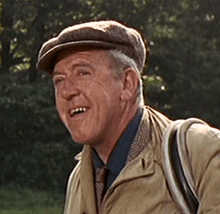Gerry Duggan
| Gerry Duggan | |
|---|---|
 in Goldfinger (1964) | |
| Born |
1910 Dublin, County Dublin, Ireland |
| Died |
27 March 1992 Sydney, New South Wales, Australia |
| Years active | 1959-1990 |
Gerry Duggan (1910 – 27 March 1992) was an Irish-born Australian character actor who appeared in many well-known films.[1] He was also a stage and television actor. He never achieved stardom, but was a familiar face in small roles in film and television.[2] His trademarks were his Irish brogue, pronounced lisp and prominent jaw.
Early life
Gerry Duggan was born in Dublin in 1910 (some sources say 1909). When he was 16 he moved to New York, where he had his early exposure to theatre acting. In the 1930s he moved to Australia, where he settled, although he worked internationally.[3]
Career
He was almost 50 when he made his first film, The Siege of Pinchgut (1959). This was a British production made in Australia, and was the last film from Ealing Studios.[4] Duggan was nominated for the BAFTA Most Promising Newcomer Award for his role as Pat Fulton. He lost to the 13-year-old Hayley Mills in Tiger Bay.[5]
He played the title role in the 1986 children's television series Professor Poopsnagle's Steam Zeppelin. He also appeared in many television episodes in Australia and Britain, in series such as A Country Practice, Mother and Son, The Flying Doctors, Skyways, The Sullivans, Matlock Police, Number 96, Spyforce, Division 4, Boney, Skippy the Bush Kangaroo, The Avengers and Coronation Street.[6]
Gerry Duggan continued to act on stage in between film and television commitments. For example, he appeared in the British debut of Samuel Beckett's play The Old Tune in 1964. He played the role of McLeavy in the 1966 London revival of Joe Orton's Loot, which he regarded as the high point of his stage career, in a production that transferred to the Criterion Theatre.[3]
He worked until his death, which occurred on 27 March 1992 in Sydney.[1][3]
Partial filmography
- The Siege of Pinchgut (1959) - Pat Fulton
- On the Beach (1959) - Bit Part (uncredited)
- The Sundowners (1960) - Shearer
- Dentist on the Job (1961) - Commissionaire
- Go to Blazes (1962) - Fireman
- Serena (1962) - Norman Cole
- The L-Shaped Room (1962) - Bert
- The Servant (1963) - Waiter
- West 11 (1964) - Father Dominic
- Goldfinger (1964) - Hawker, James Bond’s golf caddie
- Ned Kelly (1970) - Father O'Hea
- Ride a Wild Pony (1975) - Train Engineer
- Mad Dog Morgan (1976) - Martin
- The Devil's Playground (1976) - Brother Hanrahan
- The Singer and the Dancer (1977) - the Doctor
- The Picture Show Man (1977) - the Hall Secretary
- The Mango Tree (1977) - Scanlon
- Newsfront (1978) - Len’s father
- My Brilliant Career (1979) - Squatter
- The Last of the Knucklemen (1979) - Old Arthur
- Slippery Slide (1980)
- Bliss (1985) - neighbour 1
- Dark Age (1987) - Joe Blunt
References
- 1 2 "Gerry Duggan". BFI.
- ↑ "Gerry Duggan".
- 1 2 3 "joeorton.org".
- ↑ Philip French. "The Night My Number Came Up/The Man in the Sky/The Siege of Pinchgut". the Guardian.
- ↑ "BAFTA Awards".
- ↑ "Gerry Duggan movies, photos, movie reviews, filmography, and biography - AllMovie". AllMovie.